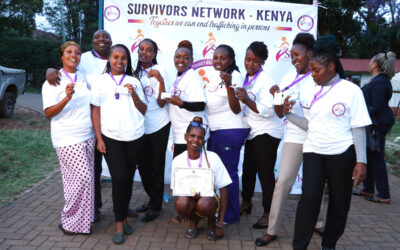People who don’t care about intellectual property rights don’t care about human rights either. That’s why Free the Slaves is proud to be affiliated with DH Anticounterfeit, a Swedish software firm that helps companies manage their investigation of counterfeiting cases worldwide. We asked DH Anticounterfeit’s Lella Bräuner about the growing awareness that fakes fuel modern slavery.
Free the Slaves: How big a problem is counterfeiting today?
Lella Bräuner: “It’s humongous. You wouldn’t believe the numbers. Everything around you is being counterfeited, it doesn’t need to be a luxury product. It includes car parts like brake pads or airbags, or airplane parts, or medicine – even pencils are being counterfeited.”
Free the Slaves: Help us connect the dots, how is counterfeiting tied to trafficking and slavery?
Lella Bräuner: “There are two connections. First, the conditions that you see at the sweatshops are pure slavery or slavery-like conditions. People are tied to sewing machines. And there’s a lot of child labor. Second, the sales of counterfeits often fund criminal activities such as human trafficking. A lot of people are buying counterfeits feeling they aren’t doing anything wrong. So, Nike might lose a few bucks if I don’t buy an original pair of shoes, but they have so much money anyway. They haven’t realized what they are actually funding through buying counterfeits. They don’t think of kids making those shoes or that handbag.”
Free the Slaves: Why have you affiliated with Free the Slaves, and what would you like to see happen?
Lella Bräuner: “I looked for an organization that I could really feel for myself. Slavery has been a very big issue, thank God people are talking about slaves. But nobody in the industry has openly talked about these downsides of counterfeiting. It’s been very hush hush for companies because they don’t want to expose that they have a problem. You are often accused of being a selfish brand, just trying to protect your own intellectual property rights and profits. You are worried as a company to be connected with something that is negative. Today you need to as a company go out and tell your consumers that you are taking this problem very seriously and you’re doing everything you can to prevent it. There is a higher cause to talk about. It’s important for them to show that they are doing this for a higher cause than themselves.”
Learn more:
DH Anticounterfeit website: here.
AP story on the human cost of counterfeit goods here.



